By Miriam Raftery
January 23, 2025 (Washington, D.C.) – A federal judge appointed by conservative Ronald Reagan called President Donald Trump’s executive order to end birthright citizenship “blatantly unconstitutional.” U.S. District Judge John Coughenour issued a temporary restraining order to block the order from taking effect, Associated Press (AP) reports. The case was filed by Washington state and others. Plaintiffs argued that the Constitution’s 14th Amendment and Supreme Court case law have cemented birthright citizenship, KQED reports. The judge’s order applies nationwide, while this and other cases are litigated and appealed. A total of five lawsuits have been filed over the issue by 22 states including California, as well as by immigrant rights groups and the American Civil Liberties Union.
“I’ve been on the bench for over four decades. I can’t remember another case where the question presented is as clear as this one. This is a blatantly unconstitutional order,” Coughenour said during the hearing, CNN reported.
Trump’s order seeks to end citizenship from being issued to children born in the U.S. if the parents are not in the U.S. legally In addition, his order would prohibit citizenship from children born to a mother who is in the U.S. on a temporary and legal basis, such as student, work, or tourist visas, unless the father is a citizen or lawful permanent resident. The order would take effect in 30 days, on Feb. 19, and apply to children born on or after that date.
The order is in direct contradiction to the U.S. Constitution’s 14th amendment, which states: “All persons born or naturalized in the United States, and subject to the jurisdiction thereof, are citizens of the United States.” Trump’s order contends that children of undocumented immigrants as well as children born to mothers here on a temporary basis are not “subject to the jurisdiction” of the U.S.
The 14th amendment was adopted after the Supreme Court’s ruling in the controversial Dred Scott v. Sandford case back in 1857, in which justices held that children of slaves were not entitled to citizenship. After passage of the 14th Amendment, a later Supreme Court case in 1898 ruled that Wong Kim Ark, an American citizen born in San Francisco, was wrongly denied reentry to the U.S. after a trip abroad and affirmed the Chinese-American man’s right to citizenship.
View our prior coverage of Trump’s birthright citizenship executive order:
CalMatters is a public interest journalism venture committed to explaining how California’s state Capitol works and why it matters
Photo: Farmworkers work on a field outside of Bakersfield in Kern County on July 25 2023. Photo by Larry Valenzuela, CalMatters/CatchLight Local
January 22, 2025 (Kern County, Calif.) - Acres of orange fields sat unpicked in Kern County this week as word of Border Patrol raids circulated through Messenger chats and images of federal agents detaining laborers spread on local Facebook groups.
CalMatters is a public interest journalism venture committed to explaining how California’s state Capitol works and why it matters
By Miriam Raftery
Image: Wong Kim Ark, whose landmark 1898 lawsuit led to a Supreme Court ruling affirming citizenship for all children born in the U.S., regardless of parents' immigration status. Born in the U.S.,Kim had been denied reentry after traveling abroad. Photo via 1904 immigration document.
January 21, 2025 (Washington D.C.) – Multiple lawsuits have been filed seeking to block an executive order yesterday issued by President Donald Trump which aims to end birthright citizenship. Trump’s order seeks to end citizenship from being issued to children born in the U.S. if the parents are not in the U.S. legally In addition, his order would prohibit citizenship from children born to a mother who is in the U.S. on a temporary and legal basis, such as student, work, or tourist visas, unless the father is a citizen or lawful permanent resident. The order would take effect in 30 days, on Feb. 19, and apply to children born on or after that date.
The order is in direct contradiction to the U.S. Constitution’s 14th amendment, which states: “All persons born or naturalized in the United States, and subject to the jurisdiction thereof, are citizens of the United States.” Trump’s order contends that children of undocumented immigrants as well as children born to mothers here on a temporary basis are not “subject to the jurisdiction” of the U.S..
The 14th amendment was adopted after the Supreme Court’s ruling in the controversial Dred Scott v.Sandford case back in 1857, in which justices held that children of slaves were not entitled to citizenship. After passage of the 14th Amendment, a later Supreme Court case in 1898 ruled that Wong Kim Ark, an American citizen born in San Francisco, was wrongly denied reentry to the U.S. after a trip abroad and affirmed the Chinese-American man’s right to citizenship.
Today, in separate lawsuits, a coalition led by the American Civil Liberties Union (ACLU) and numerous states led by California Attorney General Rob Bonta, seek to protect rights of all children born in the U.S.
“Denying citizenship to U.S.-born children is not only unconstitutional—it’s also a reckless and ruthless reputation of American values,” says ACLU executive director Anthony D. Romero in a statement . The ACLU lawsuit is joined by the Asian Law Caucus, State Democracy Defenders Fund, and Legal Defense Fund. The suit seeks temporary and permanent injunctions to block the executive order from taking effect.
California Attorney General Bonta filed a lawsuit on behalf of 18 states and the City of San Francisco, seeking an immediate temporary injunction to block implementation while litigation proceeds. Bonta calls Trump’s order “blatantly unconstitutional and quite frankly, un-American. As home of Wong Kin Ark, a San Francisco native who fought—successfully—to have his U.S. citizenship recognized, California condemns the President’s attempts to erase history and ignore 125 years of Supreme Court precedent.”
He adds, “If allowed to stand, the order would strip tens of thousands of children born each year of their ability to fully and fairly be a part of American society as rightful citizens, with all the benefits and privileges,” adding that such children would then live under threat of deportation, also losing their ability to obtain a Social Security number, work lawfully, vote, serve on juries, or run for public office.
Trump’s order would also be costly to states, putting them at risk of losing federal funding for program such as Medicaid and the Children’s Health Insurance Program, which are conditioned on the citizenship and immigration status of children served. States would have to foot the bill for modifying the operation and administration of such programs on very short notice if the Feb.19 implementation deadline is not blocked. Such action would cause “irreparable harm to the states and their residents,” Bonta’s statement concludes.
Council asks staff to revise resolution, which will be on the agenda January 28
By Miriam Raftery
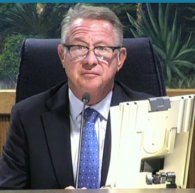 "I see this as disrespectful from you, the Council, the Mayor and the attorneys...This is going to create a lot of distrust in the community.” -- Jose Cruz, photo, left
"I see this as disrespectful from you, the Council, the Mayor and the attorneys...This is going to create a lot of distrust in the community.” -- Jose Cruz, photo, left
"It's about following the law. California is asking us to ignore federal law."--Mayor Bill Wells, photo, right
January 17, 2025 (El Cajon) – In emotional testimony, leaders of the Latino community and others pleaded with El Cajon City Council members on January 14 to reject a resolution proposed by Mayor Bill Wells aimed at maximizing the city’s cooperation with federal immigration authorities. With President-Elect Donald Trump’s announced mass deportation intent, which Trump has said could include all undocumented immigrants in the U.S., many speakers voiced fears over potential discrimination by police against people of color, as well as fears that even long-term immigrants and children who have committed no crimes could be rounded up for deportation.
Trump has also said he wants to deport some special protection status immigrants who came here legally, such as Haitians; others with TPS status include Afghans and Iraqis who helped the U.S. military, Ukrainian refugees, and others.
The controversial proposal split the all-Republican Council. After public outcry from speakers unanimously opposed to the resolution, the city council asked staff to make amendments and bring a revised version back for consideration at the January 28 council meeting, with two members voicing strong concerns.
Specifically, El Cajon’s resolution would declare the city’s intent to “assist federal immigration authorities in their enforcement efforts to the maximum legal extent possible under SB 54, the Supremacy Clause of the U.S. Constitution, and other applicable laws for the purpose of removing those posing a threat to public safety from our community. SB 54 is a California law that bans police from detaining most immigrations or cooperating with immigration authorities unless the immigrant has been convicted of certain serious felony crimes.
City Manager Graham Mitchell said that conflicting federal, state and county laws “put us in a tight spot,” noting that a letter sent by El Cajon to the state attorney general has thus far not been answered.
El Cajon is alone among local cities seeking to adopt such a resolution.
ECM asked neighboring La Mesa’s Police Chief Ray Sweeney how his police force is handling the issue. “We’re following state law. Simple--that’s it,” he said.
San Diego County Sheriff Kelly Martinez similarly has said she will follow state law, not potentially more stringent federal requests, nor County Supervisors’ more liberal resolution seeking to protect more immigrants than under state law. The Sheriff’s department provides protection for all other East County communities, including the cities of Santee and Lemon Grove, as well as all unincorporated areas.
Public comments
Some community members spoke during public comments, while others waited until the agendized item.
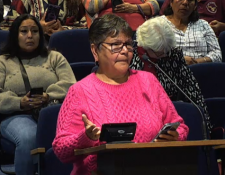 Some speakers voiced fear, others expressed outrage, and one threatened legal action.
Some speakers voiced fear, others expressed outrage, and one threatened legal action.
Eva Pacheco (photo, left) said she has lived in El Cajon for 34 years. Though the resolution claims its aim is to protect public safety, Pacheco said if police collaborate with immigration officers, “The safety of our community is not in play because they will fear the police...especially at the school I am working with, they will be less likely to seek help or report (crimes) to police officers. We have seen this...before, and with this resolution it will be worse. I really, really want toknow as a government body that you are here for the entire community....Talk to the families,” she concluded, drawing applause from the audience.
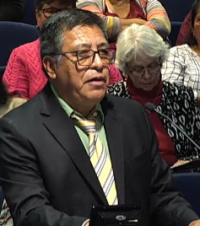 Dr. Sergio Conti (photo, right), who is originally from Argentina, said his family moved to El Cajon last February and is enjoying “this beautiful city,” but is concerned that could change if the resolution passes. “Of the population in El Cajon, 28% speaks Spanish,” he said, noting that mass deportation could eliminate farmworkers and perhaps city workers who are Spanish-speaking. He emphasized that the vast majority of immigrants are not criminals.”We came here for one reason: to give a better future to our son,” he said, adding that his son is studying at the University of California, San Diego to be a history professor. “We work hard every day to make money to pay the rent and feed our families.” He said he opposes the resolution “because it will destroy the lives of many families who only want to work in peace and give a future to their children.”
Dr. Sergio Conti (photo, right), who is originally from Argentina, said his family moved to El Cajon last February and is enjoying “this beautiful city,” but is concerned that could change if the resolution passes. “Of the population in El Cajon, 28% speaks Spanish,” he said, noting that mass deportation could eliminate farmworkers and perhaps city workers who are Spanish-speaking. He emphasized that the vast majority of immigrants are not criminals.”We came here for one reason: to give a better future to our son,” he said, adding that his son is studying at the University of California, San Diego to be a history professor. “We work hard every day to make money to pay the rent and feed our families.” He said he opposes the resolution “because it will destroy the lives of many families who only want to work in peace and give a future to their children.”
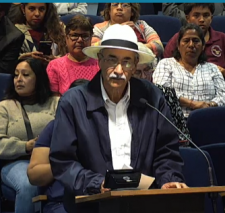 Jesus Pacheco (photo, left) from Latinos en Accion voiced concern that the resolution would damage the relationship between immigrants and police. “You represent all of us. All of us pay taxes, and we try to the best we can,” said Pacheco, who said he’s lived here for 34 years and has long been a volunteer advocate for quality education, recently succeeding in opening a new building for a middle school locally. “Think about us, and make the right decision,” he urged the Council.
Jesus Pacheco (photo, left) from Latinos en Accion voiced concern that the resolution would damage the relationship between immigrants and police. “You represent all of us. All of us pay taxes, and we try to the best we can,” said Pacheco, who said he’s lived here for 34 years and has long been a volunteer advocate for quality education, recently succeeding in opening a new building for a middle school locally. “Think about us, and make the right decision,” he urged the Council.
Jose Cruz said he is a U.S. citizen who went to El Cajon High School. “We got stopped by police. They sent Border Patrol who kept us there for hours, just harassing us,” he shared. “I don’t want to deal with that. I don’t want my kids to go through that...If your police do that, they should ask for a passport for every single citizen of El Cajon...I’m very upset with you,” he said, voicing fears that those with brown skin could be subject to stops and detention. “I’m a peaceful person...but I see this as disrespectful from you, the Council, the Mayor and the attorneys...This is going to create a lot of distrust in the community.” He said victims of crimes such as domestic violence won’t report those crimes if they fear police will call immigration officers. “I am a U.S. citizen. They won’t report me...but I don’t want an immigration officer to ask me for papers.”
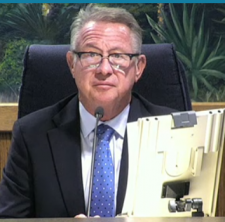 He told Mayor Wells, “I voted for you, Mr. Mayor, but this just breaks my heart, to be honest with you...I have a 7-year-old boy. I don’t want him to grow up in a place that feels like a police state for brown people. If this thing passes, I might sell my house and move,” he closed, drawing applause.
He told Mayor Wells, “I voted for you, Mr. Mayor, but this just breaks my heart, to be honest with you...I have a 7-year-old boy. I don’t want him to grow up in a place that feels like a police state for brown people. If this thing passes, I might sell my house and move,” he closed, drawing applause.
Mayor Wells interjected, “This is not about taking our police force and turning them into immigration authorities...It’s about following the law. California is asking us to ignore federal law.”
Cruz fired back,”As a Republican, we talk about local issues. This is a local issue.”
The Mayor insisted, “It’s not for us to decide.”
Cruz responded, “It is, and deciding to vote you out next time!” He added that he was talking from personal experience and recalled that as a 14 year old, he was asked for papers. In addition, he said if the resolution passes, besides creating conflicts in the immigrant community, “you’ll be diverting funds from trying to take care of homelessness to rounding up people.”
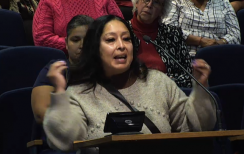 Violet Lombera (photo,right) with Latinos en Accion said after moving to El Cajon from Brawley, she was stopped by police in what she views as “racial profiling. I don’t want that to happen again...Doing this is really going to separate and divide us. It’s going to attack my community, Mexican Americans...I’ve been attacked. I’ve been segregated. I’ve been racially profiled. You guys need to reconsider this,” she said, voicing fears of people being stopped and asked for proof of citizenship. ”To do this is really going to hurt everybody in our community.”
Violet Lombera (photo,right) with Latinos en Accion said after moving to El Cajon from Brawley, she was stopped by police in what she views as “racial profiling. I don’t want that to happen again...Doing this is really going to separate and divide us. It’s going to attack my community, Mexican Americans...I’ve been attacked. I’ve been segregated. I’ve been racially profiled. You guys need to reconsider this,” she said, voicing fears of people being stopped and asked for proof of citizenship. ”To do this is really going to hurt everybody in our community.”
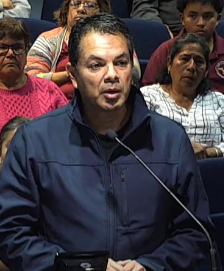 Pedro Rio (photo, left) is director of the American Friends Service Committee’s border program. “I’ve been working with community members in El Cajon for two decades or more. Considering passing this resolution is showing your true colors,” he said, then accused the Mayor of “fearmongering” that would make people afraid to walk around or shop in the city. He criticized the city manager’s statement that state law prohibits cities from using Border Patrol agents to translate, noting that such use over the years has been a pretext that led to deportation, family separations and “suffering.”
Pedro Rio (photo, left) is director of the American Friends Service Committee’s border program. “I’ve been working with community members in El Cajon for two decades or more. Considering passing this resolution is showing your true colors,” he said, then accused the Mayor of “fearmongering” that would make people afraid to walk around or shop in the city. He criticized the city manager’s statement that state law prohibits cities from using Border Patrol agents to translate, noting that such use over the years has been a pretext that led to deportation, family separations and “suffering.”
He cited Mayor Wells’ past quote claiming nearly 20 million people crossed the U.S. border illegally. “You’re misinformed,” Rio said. “Most are seeking asylum, a legal right. I implore you to read and understand the laws of this country before engaging in fearmongering and creating so much trauma in the community, for your constituents...We need to wake up and take care of this or we will lose this country completely, and a lot of us are going to lose our lives.”
Salvador Salmiento with the National Day Labor Network said he believes the Council may have good intentions, but added, “The road to hell is paved with good intentions. Our organization has litigated a bunch of these policies over the years,” adding that he has over the years repeatedly seen ICE (Immigrations and Customs Enforcement) detainers issued without probable cause.
Then he warned that if this happens in El Cajon, ”We will sue, as we have” when this occurred elsewhere, adding that in such lawsuits, “ICE doesn’t pay. The city pays...This is a public cost. I know you care about El Cajon. Don’t make this the only thing people hear about El Cajon for the next four years...If this is symbolic, it will still be damaging. If there is actual damage....we will sue...El Cajon, you are all so much better than this. Say no today. El Cajon can be a better example than this.”
Adriano Jasso with the American Friends Service Committee supported members in El Cajon and held meetings with the former Chief of Police regarding SB 54 implementation. “We highlighted the importance to have trust,” Jasso said. “Declaring the intention to assist with federal authorities will set you aside from the rest of the County and potentially bring a spotlight to the community that is anti-immigration, anti-worker, anti-family,” adding that this would “add to the anxiety and uncertainty for people who may be in the country without documentation. Think about the mixed status families; what message are you sending to school children?” She urged Council to reject the resolution and remember that the represent all the people of El Cajon, including families, children and workers.
Arlette Reyes, a nurse and American citizen who came here as an immigrant, said her parents brought her here because Mexico in those days didn’t have enough opportunities for women. “The 1960s and ‘70s are really not that far away,” she said, recalling an era when Spanish could not be spoken in schools, segregation of Mexican-Americans occurred, and police engaged in racial profiling. She fears that people with foreign-sounding names and dark skin will “not be looked at like a citizen.” Reyes
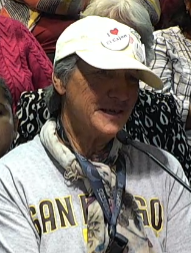 voiced fear for her daughter, who is African-American and Mexican-American, adding that she wants the city to focus on the homeless. Instead of targeting migrants, noting that most of the homeless are “citizens, born and raised here.”
voiced fear for her daughter, who is African-American and Mexican-American, adding that she wants the city to focus on the homeless. Instead of targeting migrants, noting that most of the homeless are “citizens, born and raised here.”
Brenda Hammond (photo, right) invited everyone to “look up the Lemon Grove incident,” which was a segregation case involving the Lemon Grove School District and Mexican-American children. She said most of her friends are Mexican-Americans who came here as children or young people to escape serious problems. “They are grandparents now.”
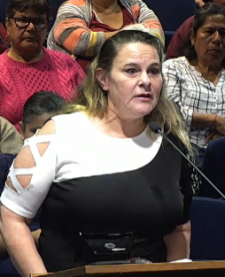 Stephanie Harper (photo, left) observed, “The last time I heard anybody talk about `let me see your papers’ was Nazi Germany. That’s really scary. A lot of people here are scared, too...We’re all immigrants, unless you’re Indian.” She quoted former president Ronald Reagan: “You can come to American and become an American. That’s what makes us great.” She said the resolution will cause “problems we can’t foresee,” then told the Mayor, “I think this is just a step in your political career, Mr. Wells, to show other people what you’ve done,” adding that this action would not be a good one. The crowd applauded.
Stephanie Harper (photo, left) observed, “The last time I heard anybody talk about `let me see your papers’ was Nazi Germany. That’s really scary. A lot of people here are scared, too...We’re all immigrants, unless you’re Indian.” She quoted former president Ronald Reagan: “You can come to American and become an American. That’s what makes us great.” She said the resolution will cause “problems we can’t foresee,” then told the Mayor, “I think this is just a step in your political career, Mr. Wells, to show other people what you’ve done,” adding that this action would not be a good one. The crowd applauded.
Council discussion
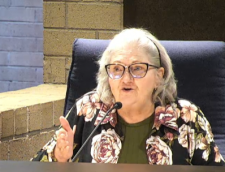 Councilwoman Michelle Metschel (photo, right) said she’s talked to residents including in the Hispanic community and believes “they have a real fear that their community is targeted.” She voiced concern that her daughter, whose father is from El Salvador, could be targeted and noted that one relative “may be illegal.” She noted that our region has immigrants from around the world and wants to be sure if “bad actors” are the issue that Hispanics are not targeted.
Councilwoman Michelle Metschel (photo, right) said she’s talked to residents including in the Hispanic community and believes “they have a real fear that their community is targeted.” She voiced concern that her daughter, whose father is from El Salvador, could be targeted and noted that one relative “may be illegal.” She noted that our region has immigrants from around the world and wants to be sure if “bad actors” are the issue that Hispanics are not targeted.
“I originally signed on to support this,” she said of the resolution, “but as an adult and a representative of my community, I’m entitled to chance my mind as I get more information and as people talk to me,” Metschel added, drawing applause. “These are the heart and soul of what we’re representing,” she said of the speakers present. “I am elected to support them.”
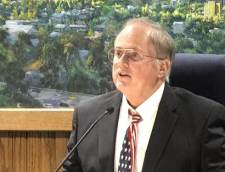 Vice Mayor Gary Kendrick (photo,left) gave an impassioned speech, noting that Metschel and public speakers raised some “good points.” Then he revealed, “My mother was living in Czechoslovakia in 1939 when Hitler came in. They said `Jews have to wear yellow stars, but that’s all that we’re doing.’ Then the Gestapo came for her boss, they dragged him out of the office to wash cars, then they dragged him out again and nobody ever saw him again...I’m very concerned about civil rights, because things tend to creep along and get worse...It’s important we work hard to safeguard everybody’s rights,” he resolved, as the crowd applauded.
Vice Mayor Gary Kendrick (photo,left) gave an impassioned speech, noting that Metschel and public speakers raised some “good points.” Then he revealed, “My mother was living in Czechoslovakia in 1939 when Hitler came in. They said `Jews have to wear yellow stars, but that’s all that we’re doing.’ Then the Gestapo came for her boss, they dragged him out of the office to wash cars, then they dragged him out again and nobody ever saw him again...I’m very concerned about civil rights, because things tend to creep along and get worse...It’s important we work hard to safeguard everybody’s rights,” he resolved, as the crowd applauded.
Vice Mayor Kendrick continued, “Immigrants are part of the fabric of our community and I don’t want to tear that apart.” He indicated he was okay with handing over convicted criminals, but added, “I do not want to see children dragged out of church, or out of school.” He agreed that undocumented people would be frightened to report crimes or serve as witnesses, adding, “Criminals know they can get away with horrible things because everybody is afraid they’ll be deported...That’s bad policy.” He noted that immigrants contribute financially and some even pay into Social Security. With the U.S. birth rate below the replacement rate,we need more people to come in, he said. “I believe the vast majority of those are honest, hard-working people who make this a better place,” adding that he thrives on the diversity in El Cajon, such as the manyethnic restaurants.
Then for the first time in his 22 years on the City Council, Kendrick quoted a Bible version from Deuteronomy: “You shall also love the strangers, for you are strangers in the land of Egypt.” Kendrick concluded that he doesn’t want to be on the side of those who rounded up Jews and persecuted others under Hitler, when his mother was young.
Kendrick suggested the resolution, if adopted at all, should be amended to add a sentence limiting its enforcement to “only those convicted of serious crimes,” as state law already allows. “I don’t want people living here in fear, because my mom went through that,” he concluded.
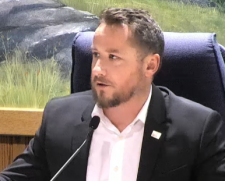 Councilman Phil Ortiz (photo, right), who represents a heavily Latino district and is from a second-generation Latino immigrant family, thanked the audience for staying civil. “I don’t think there is a city in the county more welcoming to immigrants than El Cajon,” he began, noting that the city translates materials into several languages and offers grants within immigrant communities. But he said the conflict between state and federal immigration laws need to be worked out. “We need clarification as a city; are our police officers going to be prosecuted when we talk to Border Patrol agents or ICE about someone defrauding someone or a domestic violence suspect or someone getting ready to commit a crime?” He said police officers are “just as worried” as immigrants and suggests SB 54 could mean officers being locked up if they cooperate with ICE beyond what the state law allows.
Councilman Phil Ortiz (photo, right), who represents a heavily Latino district and is from a second-generation Latino immigrant family, thanked the audience for staying civil. “I don’t think there is a city in the county more welcoming to immigrants than El Cajon,” he began, noting that the city translates materials into several languages and offers grants within immigrant communities. But he said the conflict between state and federal immigration laws need to be worked out. “We need clarification as a city; are our police officers going to be prosecuted when we talk to Border Patrol agents or ICE about someone defrauding someone or a domestic violence suspect or someone getting ready to commit a crime?” He said police officers are “just as worried” as immigrants and suggests SB 54 could mean officers being locked up if they cooperate with ICE beyond what the state law allows.
He tried to reassure those present that broad roundups of immigrants wouldn’t happen. “People say we’ll become the Gestapo. We don’t have the budget for that,” he said, but insisted, “It doesn’t do the community any good to shelter criminals who shouldn’t even be here.”
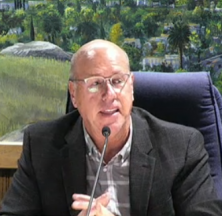 Councilman Steve Goble (photo, left) said he agrees that California and America have thrived because of immigrants, and that trust between immigrants and officials is important. But he insisted that being asked for papers by police won’t happen because it’s prohibited by state law
Councilman Steve Goble (photo, left) said he agrees that California and America have thrived because of immigrants, and that trust between immigrants and officials is important. But he insisted that being asked for papers by police won’t happen because it’s prohibited by state law
“Our interest is protecting you,” he said. Goble suggested changing the title of the resolution, which currently is “Declaring the city’s intent to assist federal immigration authorities to the maximum legal extent permissible under SB 54 and other applicable laws,” to instead emphasize focus on protecting the community. But he maintained that people such as convicted murderers and rapists need to be removed, and that missing unaccompanied minor immigrants need to be found. “We don’t need to find someone who is a landscape company owner or a housekeeper or an accountant or an engineer.”
Councilman Kendrick, seeing that the majority appeared to favor the resolution, suggested sending it back to staff to clarify that police should cooperate with ICE only for convicted criminals.
Goble disagreed. “We are at a precarious situation right now. Two government agencies higher than we are taking opposite sides so we are asking for clarification,”he said, though a resolution isn’t required for the city to continue to seek clarification on legalities. “I don’t think we are being racist or provocative. ...I don’t think we need to send this back,” indicating a willingness to vote for the measure. ”No Nazi Germany situation is happening here,” he added, drawing protests from the crowd. “We don’t want to be prosecuted...this came up because our police officers could lose their jobs, lose pensions, or be sued civilly if they follow the law.
Motions and vote
Goble then made a motion to adopt the resolution.
But Metschel asked pointedly, “Why do we have to make a resolution?”
Mayor Wells conceded, “We don’t have to,” and the audience applauded.
Metschel noted that the city has already asked for guidance from the state attorney general, who didn’t respond. “We already did that. We don’t need a resolution to do that. We don’t need a resolution to maintain public trust...and the majority of the public here right now, they are not trusting us...We’ve affirmed commitment to public safety, so why do we need a resolution to reaffirm commitment to safety?”
The Mayor said, “The reason is because the state of California is at odds with the feds,” though no other local city has seen a need to pass a resolution on this issue.
Goble then proposed a substitute motion to send the draft resolution back to staff to “reflect some of the concerns we’ve heard here today, affirming existing community values and emphasizing the purpose of protecting all citizens from those who have committed crimes and who are here illegally.”
The motion to send the resolution back to staff passed 4 to 1, with only Mayor Wells voting in opposition.
The Mayor thanked everyone for “participating in democracy.”
Next hearing
The revised resolution is slated to be on the agenda for the next El Cajon City Council meeting on Tuesday, January 28 at 3 p.m. at El Cajon City Council Chambers,200 Civic Center Way in downtown El Cajon.
View video of full Council meeting on Jan. 14, 2025
Contact information for El Cajon City Councilmembers:
Mayor Bill Wells
(619) 441-1788 / bwells@elcajon.gov
Gary Kendrick, District 1, Mayor Pro Tem
(619) 441-1788 / gkendrick@elcajon.gov
Michelle Metschel, District 2
(619) 441-1788 / mmetschel@elcajon.gov
Steve Goble, District 3
(619) 441-1788 / sgoble@elcajon.gov
Phil Ortiz, District 4
(619) 441-1788 / portiz@elcajon.gov
By Jessica Brodkin Webb
January 7, 2025 (El Cajon) --In 13 days, President-elect Donald Trump could potentially begin to make good on his campaign promise to pursue mass deportations of immigrants and refugees living in the United States.
“As President I will immediately end the migrant invasion of America," Trump said in a Sept, 2024 speech and although he has not released specific details of how he might direct such a plan at a federal level, community leaders stand divided on how best to respond at the local level.
Under current California law, state and municipal governments are barred from working in conjunction with federal law enforcement agencies to actively pursue deportation for anyone who has not committed a serious crime. That approach stands in direct opposition to Trump’s proposed plan to conduct mass immigrant deportations.
El Cajon Mayor Bill Wells, in a letter to the Calif. Attorney General, says he plans to propose that his city fully cooperate with federal immigration authorities. San Diego’s Board of Supervisors majority, by contrast, has urged county authorities not to turn over any immigrants to federal authorities, while the County Sheriff has said she will take the middle ground and follow state law, cooperating only when immigrants have committed serious crimes.
Besides posing a challenge for local elected officials who must decide how they will answer to conflicting state and federal guidelines, an element of murkiness also exists for prominent community members and social service agency heads who spend many hours each week working directly with refugees.
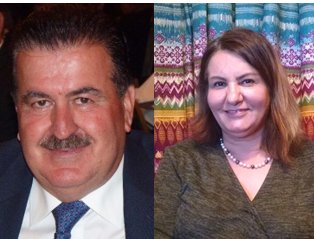 Photos by Miriam Raftery: Noori Barka and Dilkhwaz Ahmed, leaders of El Cajon nonprofits aiding immigrants and refugees, have contrasting views on deportations
Photos by Miriam Raftery: Noori Barka and Dilkhwaz Ahmed, leaders of El Cajon nonprofits aiding immigrants and refugees, have contrasting views on deportations
For example, Chaldean Community Council Founder Noori Barka said he doesn’t like to see people enter the country illegally and supports Trump’s plan to deport immigrants and refugees.
According to the Chaldean Community Council website, the social service organization provides “essential resources and support to help Chaldean and Middle Eastern families build a new life in El Cajon.” For individuals and families who have legally entered the country, they offer assistance with job placement, healthcare coordination, legal guidance and educational assistance among other things.
“I am against any illegal immigration and generally support people coming in the right way. Come like we all came, as immigrants, in a legal way. We have to do the right thing. Come with a degree, a relative, with refugee status.” Barka said.
He believes established members of East County’s Chaldean community, one of the largest in the nation, “came through the legal way” and with vetted backgrounds. Young people with “something to offer” are an asset, he said, including those who are able to enter the country legally with an H1 (work) visa.
However, Barka is concerned that recent waves of immigrants have not been subject to any background investigation and could bring danger to the community.
“People who are coming now, we don’t know their backgrounds and it's scary because sometimes we get criminals. We have to have the right to protect our borders and we have to have the right to allow people who want to come to the county to ask permission, but after we do a background investigation,” Barka said.
Meanwhile, License to Freedom Executive Director Dilkhwaz Ahmed who works daily with domestic violence survivors said some victims arrive undocumented and turning them back around after a harrowing journey to safety puts them at extreme risk. Niche populations such as these, she said, need special and individual consideration outside an all-encompassing policy.
“They’ve traveled thousands of miles to come to a safe country. Sending back those women and children, we put them at risk and what are we going to say: we can’t protect them? This population really needs us to support them, to give them a safe place, get them documents to start as a new human being,” Ahmed said.
Photo, left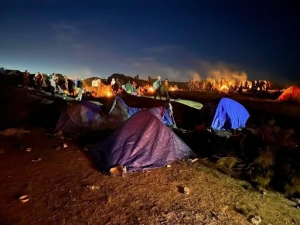 , a migrant encampment near Jacumba in San Diego County has drawn immigrants from around the world.
, a migrant encampment near Jacumba in San Diego County has drawn immigrants from around the world.
The legal process can take years, she explained, from connecting a newly arrived individual to an attorney, then helping them connect their situation with evidence of domestic violence.
“I have a client from Afghanistan, the Taliban killed her husband and it took her seven years to make it to the United States. She called me, scared she would be deported. Imagine what would happen if we send back this woman? What could happen to her? What is her destiny?” Ahmed asked.
The immigrant population she works with “came to the country for democracy, opportunity” and while License to Freedom doesn’t serve many undocumented individuals, there are some, Ahmed said. She wishes some of their cases could be reviewed from a different perspective.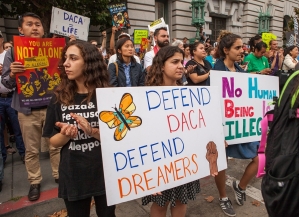
Barka has a no-exceptions outlook on illegal immigration while Ahmed prefers to hear one’s story before deciding how to proceed, yet both rely on individual background information. In contrast, Trump’s plan— albeit lacking in granular details— emphasizes removing as many immigrants as possible regardless of their lived history—even DACA recipients or “Dreamers” brought to this country as children.
Photo, right, 2018 San Francisco rally for young immigrants brought here as children, Protected under DACA, they may now face deportation under the Trump administration
American Civil Liberties Union Executive Director Anthony Romero said, “President-elect Trump will soon have the full power of the U.S. government machinery at his disposal to target and displace immigrants at a scale our nation has never experienced,” prompting the question of where viewpoints like that of Barka, Ahmed or other leaders who parse individual stories from the larger immigrant invasion fit in with public policy.
In the end, Ahmed said, people need to find a sensible solution for immigration policy which she believes can only be attained when people with political differences are willing to sit through a calm conversation and find common ground.
“Deporting criminals? Yes. Why should they be here? But people who come to work and pay taxes, are good human beings and good citizens? We need to stop pointing fingers at each other, start to listen and come up with solutions. Both parties have to give some,” she concluded.
